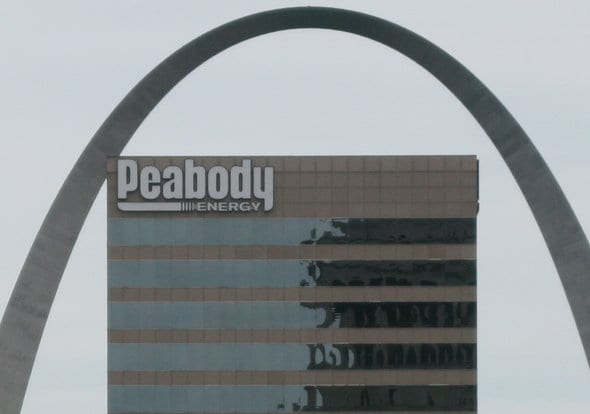
The largest coal miner in the United States, Peabody Energy Corp, on Wednesday revealed in regulatory filings to the Securities and Exchange Commission (SEC) that there were doubts it could continue as a going concern. As such, it may voluntarily seek protection under Chapter 11 – in other words, bankruptcy. Peabody elected not to pay $71 million in interest payments due yesterday, leaving it 30 days to find the money.
Markets reacted as expected – Peabody shares plunged up to 49%, after losing 97% of their value in past year. Peabody corporate debt continues to trade at less than 10% of its face value.
What does this mean for Australian investors? Well, it’s likely that thanks to the continued negligence of Australia’s superannuation industry, many of us have lost money on Peabody’s dramatic decline.
Most super fund managers would have their members believe that they have no exposure to Peabody Energy Corp. That may be the case today, but almost all funds would have had some exposure to the company in the last five years.
In April 2011 Peabody shares traded well above $1200, they now languish at a little over $2. At its post-GFC peak, Peabody was one of the 150th largest companies in the United States, a member of the S&P 500 and other globally recognised indices. By September 2014, it had fallen out of the S&P 500 altogether.

So what? Well, Market Forces research suggests that Australian super funds invest anywhere between 25% and 50% of their Australian and International equities in passive funds. Passive funds track a specific index, like the ASX300, S&P500 or MSCI World. So until late 2014, virtually every Australian super fund would have had some exposure to Peabody’s decline.
And yet, even after it fell out of the major indices, some funds would have remained exposed. Some investment managers believe that coal prices, and Peabody’s share price will inevitably bounce back. Some will cynically bet on intra-month or intra-day spikes – ultimately gambling members’ money on coal’s inexorable decline.
Super funds will often tell us that they prefer to engage with companies like Peabody, rather than divest completely from them. Or they claim their Environmental, Social and Governance (ESG) policy coupled with prudent investment decisions will manage the transition away from coal. This has proven to be utterly false. Unless their policies specifically limit or restrict investments in coal, then some investment managers will still consider coal to be a bet worth taking.
If we look at the major bondholders of Peabody’s $6 billion mountain of debt, we see a similar story. Global asset managers like Alliance Bernstein, Blackrock, Capital Group, FMR and Vanguard are prevalent, holding debt that now trades in some cases for less than 1% of what is was issued at. These are the same managers that our super funds delegate management of your retirement to.
Much has been written about the demise of coal. And yet, super funds continue to invest in the sector, and continue to lose our money. This is not bad luck or win some, lose some, this is negligence writ large. Some managers have told us that they have no choice but to invest in coal companies if a stock is a member of an index. They claim it’s too costly to exclude a stock or a sector. This is lazy thinking; but even if a customised index is more costly, it is not as costly as being invested in coal.
When we talk about climate risk, this is what we are talking about. Australian super funds must take decisive action to ensure that their members are not burned by every bankruptcy to come. The fact is, with the world’s governments slowly waking up to the climate crisis, every single fossil fuel company is overvalued, as their reserves will be forced to stay in the ground, thereby becoming stranded. Super funds must restrict investments in coal, in both their active and passive equities, fixed income and infrastructure portfolios. Fiddling while the coal sector burns is no longer a viable strategy.








